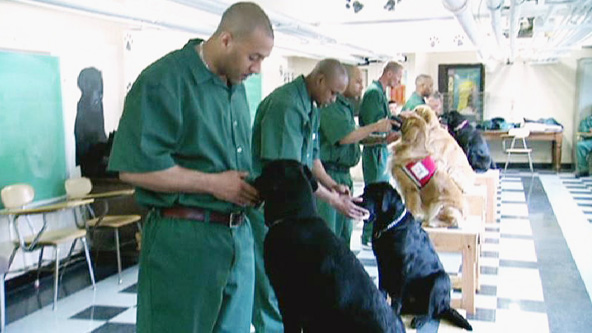Humans have been living with domesticated dogs for thousands of years. Though the reasons for keeping domesticated dogs around may be different, for different people, at different times, it is well understood that the unconditional love of a dog is highly valuable. Studies have shown that having a dog around can lower blood pressure and have a significant calming effect. Taking care of a dog can give your life more of a sense of purpose and can help create a sense of pride. Due to the harsh realities of prison life, these reasons and benefits of a animal companionship are amplified for prisoners lucky enough to be in programs that incorporate pets. Prison Pet Partnership is a non-profit right here in Washington that works with the women in the Washington Corrections Center for Women in Gig Harbor and dogs through a number of programs and for many purposes. Through the program, the women at the correction center provide:
- Basic training for rescue dogs to be prepared for adoption.
- Training for service dogs.
- Basic obedience training for community-owned dogs and their owners.
- Day and overnight dog and cat boarding services.
- Dog and cat grooming services.

“Prison Pet Partnership gives inmates the opportunity to learn valuable pet care vocational skills to use in finding employment when they resume their lives outside of prison. In addition to training, boarding, and grooming dogs, inmates also gain clerical skills by working in our office. To ensure that they receive ample experience in the pet care industry, inmate employees are required to spend a minimum of two years with us.” (http://www.prisonpetpartnership.org/html/about.html)

In her book, Animal programs in prison : A comprehensive assessment, G. Furst (2018) cited one study that was conducted in 2004 on programs that provide dogs to people with disabilities such as blindness, physical limitations, or folks who are wheelchair-bound as well as people with autism. The correctional facilities work with nonprofits that provide the canines for the participant inmates to work with. Participants are paired with an animal which they usually spend all day with. The inmate participants reported benefiting from the program in many ways. They reported experiencing not only positive relationships with the animals but also prison staff, administrators, and members of the community as well. Some also reported a sense of restitution and contributing to society. (Furst, 2011)

From this study, the most commonly cited benefit was the sense of responsibility experienced from caring for a dependent animal. Some other benefits where job skills, vocational instruction, the ability to engage in meaningful work that is particularly community service based. Participants learned patience and anger management skills, while the program enhanced participants self-esteem. Many said that the program fostered empathy, taught parenting skills, improved communication skills and when finished, participants experienced a sense of Pride or accomplishment. There was a humanizing or calming effect reported on the facility from the program, while an increased amount of self-control or behavior was noticed. Finally, relationship skills and trust grew, while stress went down for participants. (Furst, 2011)

References
Furst, G. (2011). Animal programs in prison : A comprehensive assessment. Boulder, Colorado ; London, [England]: FirstForumPress.
Prison Pet Partnership. (n.d.). Retrieved from http://www.prisonpetpartnership.org/html/about.html


